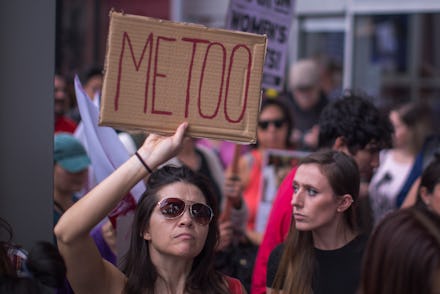California passes bills to prevent silencing of sexual harassment victims

Nearly a year since the New York Times and the New Yorker filed their bombshell reports on Harvey Weinstein, which kicked off the #MeToo movement, California is poised to pass laws preventing employers from silencing victims of sexual harassment and assault.
The California Legislature passed two bills last week aimed at helping sexual harassment victims and the bills are now awaiting Gov. Jerry Brown’s signature to become law. One bill, AB 3080, would ban confidential agreements regarding harassment and mandatory arbitration agreements in employment contracts, which are often used to prevent sexual harassment and assault victims from seeking justice.
The other, SB 820, would prohibit nondisclosure agreements that prevent the “disclosure of factual information” in sexual harassment, assault and discrimination settlements. The bill would still allow settlement agreements in sexual misconduct cases and allow the victim’s name to remain private, but the name of the perpetrator cannot be concealed.
“By banning secret settlements in cases of sexual assault, sexual harassment and sex discrimination, California will effectively eliminate one of the main tools that perpetrators have used over the years to silence victims and deny them justice,” California Sen. Connie Leyva, who sponsored SB 820, said in a statement. “I am grateful that the Legislature passed SB 820 and am hopeful that Governor Brown will sign this legislation as it would be a truly historic win for victims that will no longer have to suffer at the hands of perpetrators that have hidden behind the curtain of secrecy created by these settlements.”
California’s pending legislation is part of a broader nationwide trend toward banning nondisclosure agreements. Measures restricting NDAs have been introduced in at least 16 states, and have already become law in Arizona, Maryland, New York, Tennessee, Vermont and Washington.
Advocates of the #MeToo movement have said nondisclosure agreements and forced arbitration are a barrier to women speaking out and seeking justice against their abusers.
“One of the very first things that we in Hollywood realized as this movement began to burst forth was the problem of forced arbitration and nondisclosure agreements,” actress Jane Fonda said during a panel discussion in support of AB 3080. “How many of my peers in Hollywood talked to me about this barrier that they face to coming forward and making their stories public?
“This is such a barrier also to our being able to see patterns in the workplace, because it’s all secret.”
There are potential downsides to the proposed legislation. Attorneys cited by the Associated Press said employers could be less likely to settle sexual misconduct cases without confidentiality agreements, forcing victims into costly legal battles and potentially resulting in cheaper settlements for the victim. The Supreme Court also ruled in May that mandatory arbitration clauses can be legally enforced, opening the California legislation up to potential legal challenges.
Yet lawmakers have still signaled that ensuring victims cannot be legally silenced is an important step.
“This is a way to ensure that workers moving forward, especially in this era when we know that we need to bring sunlight to the issues that have been happening in the workplace, that we can have a realistic conversation about what types of things are going on, especially by serial abusers,” California Assemblywoman Laura Gonzalez Fletcher, who authored AB 3080, said during a press conference prior to the bill’s passage. “It’s time to shine a light on this, and we think that AB 3080 is the tool that can do that.”